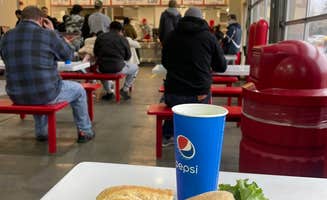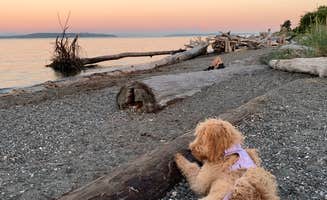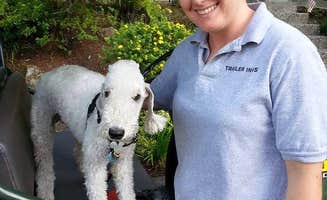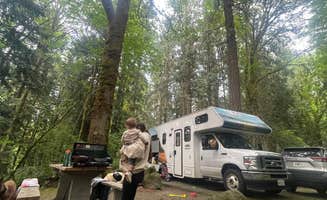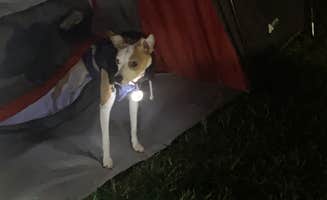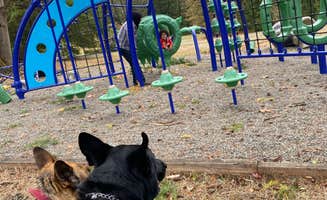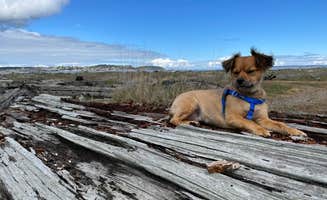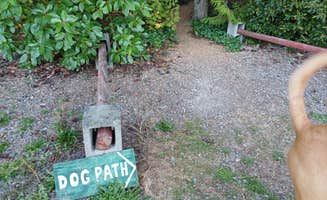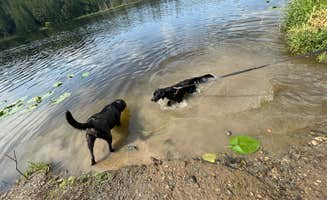Lynnwood's camping areas sit at elevations between 300-500 feet in western Washington's temperate rainforest climate. Winter camping sees average temperatures of 40-45°F with frequent rainfall, while summer brings 70-80°F days with minimal precipitation. Most campgrounds remain open year-round with full hookup capabilities during winter months when tent camping becomes less practical.
What to do
Explore historic military structures: Fort Flagler Historical State Park Campground offers unique exploration opportunities beyond standard camping. "Lots to do there...beach, crabbing, clamming, playground, sport courts, trails, and the most fun is exploring all the gun batteries. We did the tour and it was very informative," notes camper Jill T. The park features preserved gun emplacements and a museum documenting coastal defense history.
Visit urban wildlife areas: Paine Field Community Park provides access to natural spaces without leaving the city. Wayne B. describes it as "a great clean safe place in the city and surrounded by trees and nature." The park features established walking paths and observation areas where visitors can spot native wildlife while remaining within city limits.
Winter cabin camping: For off-season comfort, Flowing Lake Park & Campground offers heated cabins year-round. "We typically visit the cabins here in the winter, so we don't usually partake in the summer activities of swimming, boating, etc., but we do love coming here in the winter. The cabins are heated and have bunk beds, which makes for a cozy retreat into nature in the winter," reports Marisa N.
What campers like
Privacy between sites: Lake Pleasant RV Park offers spacing features not common in urban campgrounds. Terri notes, "Great privacy hedges between spots. The areas were paved and level. A great place to walk around and enjoy during your stay." The park's layout maximizes separation despite its urban location.
Access to marine environments: Campers consistently mention beach access at multiple locations. At Fay Bainbridge Park, Brandon K. explains, "There is a ship playground for the kids and beach volleyball court." The waterfront access provides activities beyond standard camping, with views of Puget Sound.
Small-scale tent camping options: Smaller private properties offer alternatives to larger established campgrounds. At Woodlands at Lake Stickney, Don L. reports, "It was my first time camping on a private residential property. I've grown so used to sites like KOA that it was strange to have friendly owners serving us rather than paid staff. They took a lot of care in making sure we were comfortable while also giving us our privacy and space."
What you should know
Site size limitations: Many RV parks enforce strict size limits. North Sound Recreational Vehicle Park requires that "Your travel trailer must be year 2005 or newer" and "No trailers larger than 35' long, ideally." These restrictions help maintain the park's standards but limit options for older or larger rigs.
Seasonal price changes: Several campgrounds implement seasonal pricing structures. Dene H. notes about Lake Pleasant that "During the peak season all monthly visitors have to move on to other parks or pay triple the price." This practice is common throughout the region, with winter stays typically costing 30-50% less than summer rates.
Weather impacts: Winter camping requires preparation. Fort Flagler camper Mike K. advises, "Awesome fall and winter camping. First come first serve after Oct 31st... Website said water was turned off at the sites but all sites still had water... Docks are pulled out of the water during winter months. Upper campground is closed during winter."
Tips for camping with families
Playground availability: Kitsap Memorial State Park Campground includes family-friendly features beyond traditional camping. According to K D., the park has "a very nice playground and a very nice venue building. A lot of picnic tables in the open and in the shade of trees."
Spacing between family sites: When traveling with children, site selection matters. Kris W. advises about Kitsap Memorial: "The property itself is great. There's a playground and a couple large open fields for kids to play. Also really close to the water which is cool. The spots with hookups are REALLY close together though."
Winter activity alternatives: Families visiting during colder months will find heated options. Annie K. shares about Flowing Lake: "My Questival team stayed at Flowing Lake in cabins in October, and we loved it! Cabin was clean and warm despite chilly weather!" The cabins provide an alternative for families not equipped for cold-weather tent camping.
Tips from RVers
Urban amenities access: RVers appreciate convenience to services. At Lake Pleasant RV Park, John M. notes, "Close to Seattle, feels secluded, but you can walk or take a short drive to restaurants, groceries, anything you could want or need." This accessibility makes the location practical for longer stays.
Monthly stay options: For extended visits, several parks offer monthly rates. Dene H. shared about Lake Pleasant: "This is the nicest park with the best rates close to the Seattle area. It's north of Lake Washington so you can skip bridge traffic and tolls. It has easy access to UW Bothell. I lived here in off season when I was attending university."
Utility considerations: RVers should note utility availability varies by park. K D. mentions at Kitsap Memorial that "Water pressure is low, averaging just over 20psi," while Kirby M. notes about Flowing Lake: "Has water electric and token showers. No dump spot!" These details matter for planning longer stays.



